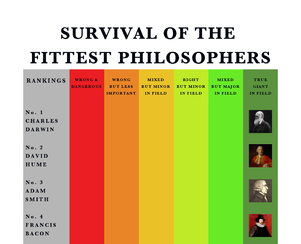
It's time now to make this investment pay off in other ways. After I spend a few weeks spreading the word about my philosophy paper, I'm going to get back to writing fiction. I've got the first draft done of an exciting new novel that I hope to finish editing by summer, and lots of short story ideas to polish off after that while I shop the novel for publication. I'll continue philosophizing on these Friday blogs, but not again until March 6th after a short holiday to get some sun and celebrate my 13th wedding anniversary. In the meantime, check out the new additions I've added to the website that help summarize the milestones I've reached. There's stuff containing:
- my journal article, in case you've missed it;
- a map of the survival rankings of the fittest philosophers;
- more news items in my Press Kit (2024 edit: since removed); and
- FAQs for my Bridging the Is-Ought Divide paper, including questions about Nazis, Rape, other Evolutionary Ethicists, how to apply the principles, and many more. Be sure to send me your own question if you want it added to the list.
Thank you so much for all your support through this process. I know all this navel-gazing can appear self-centered at times and more than a little esoteric at others, so every little nod or mention that you are interested in what I'm writing has been a joy to receive. I'll be back with more soon!

